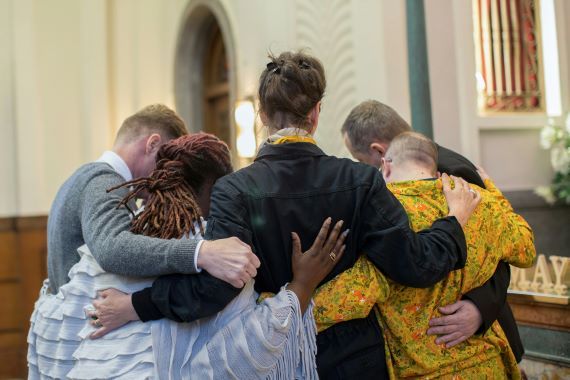163 Main St.
Pennsburg, PA 18073
Fax: 215-679-5782
Coping with the Emotional and Psychological impacts of Grief
Learn how to cope with the emotional and psychological effects of grief. Explore healing tips and cremation services to honor your loved one.

Grief is an inevitable part of life, yet its emotional and psychological impacts can be overwhelming. The loss of a loved one often triggers a profound emotional response that can affect individuals for weeks, months, or even years. Understanding how to navigate grief can be an essential part of the healing process, and many people find solace in the rituals of memorials or cremation services in Bethlehem, PA, which can help provide closure.
Understanding the Grieving Process
Grief manifests differently for everyone, but it commonly unfolds in stages. These stages—denial, anger, bargaining, depression, and acceptance—are not linear and can vary in intensity. One may oscillate between emotions, experiencing deep sadness one day and frustration or numbness the next. Recognizing that these reactions are normal can help individuals feel less isolated in their pain.
During the denial stage, it can be hard to comprehend the loss, and many find themselves stuck in disbelief. As grief progresses, feelings of anger may emerge, which are often directed at the situation, oneself, or others. Eventually, as reality sets in, some may attempt to bargain, thinking about "what if" scenarios and contemplating ways the loss could have been avoided. Depression often follows, characterized by deep sadness, loneliness, or fatigue. Finally, with acceptance, individuals begin to adjust to life without their loved one, though the sadness may never completely dissipate.
Emotional and Psychological Impacts of Grief
Grief's emotional toll can be profound. Beyond the sadness and sorrow, individuals may experience anxiety, guilt, or even relief, depending on the nature of the loss. For example, those who have lost someone after a long illness might feel relieved that their loved one is no longer suffering, which can lead to feelings of guilt.
Psychologically, grief can disrupt one’s ability to think clearly. It can lead to difficulty concentrating, memory issues, and confusion. This emotional fog often makes decision-making challenging, particularly when it comes to planning memorials or final arrangements. Simple tasks can feel overwhelming, which is why seeking support—whether through family, friends, or professional services—can make a significant difference.
Coping Strategies for Grief
While the grieving process is personal and unique, there are several strategies that can help individuals cope with the emotional and psychological weight of loss:
Allow Yourself to Feel: It is important to give yourself permission to grieve. Suppressing emotions may lead to longer-term emotional strain. Allowing yourself to cry, vent, or express your feelings openly is a healthy part of the process.
Seek Support: Whether from close family members, friends, or support groups, surrounding yourself with people who understand your pain can be comforting. In addition, many individuals find solace in speaking with counselors or grief therapists who specialize in helping people navigate loss.
Maintain a Routine: While it may seem difficult, establishing and maintaining a daily routine can help provide structure during a time of emotional chaos. Even small tasks, like taking a walk or cooking a meal, can offer a sense of normalcy and control.
Engage in Memorials or Rituals: Funeral or cremation services allow people to pay tribute to the deceased, which can bring a sense of closure. These rituals offer a space to reflect on the life of the person who has passed and to say goodbye in a meaningful way.
Practice Self-Care: Grieving can take a physical toll, leading to fatigue, poor appetite, or difficulty sleeping. It is essential to take care of your body by eating nutritious meals, resting when needed, and engaging in physical activity.
The Role of Cremation Services in the Healing Process
Many find comfort in memorial services, such as those offered by cremation services in Bethlehem, PA. Cremation provides families with flexibility in creating meaningful tributes to honor their loved ones. Whether through scattering ashes in a significant location, holding a memorial service, or keeping the ashes in a cherished urn, cremation allows for a personalized way to say goodbye.
For some, the act of planning a service or deciding how to memorialize the deceased helps them channel their grief into something constructive. It can also provide an opportunity for family and friends to gather, share memories, and offer mutual support. These moments of connection often play a vital role in the grieving process, as they remind individuals that they are not alone in their sorrow.
Moving Forward While Honoring the Past
Moving forward does not mean forgetting the person who has passed. Instead, it involves finding ways to continue living while keeping their memory alive. Whether it is through annual traditions, creating a memory book, or simply speaking about them often, honoring the deceased is a healthy way to integrate the loss into your life.
It is important to remember that grief does not have a set timeline. Some may feel more at peace after a few months, while others may continue to struggle for years. There is no right or wrong way to grieve, and it is crucial to be patient with yourself throughout the journey.
In conclusion, while grief can be a difficult and isolating experience, coping with its emotional and psychological impacts is possible through understanding, support, and time. If you are looking for compassionate cremation services in Bethlehem, PA, Falk Funeral Homes & Crematory Inc. offers personalized options that honor your loved one while helping you find peace.









